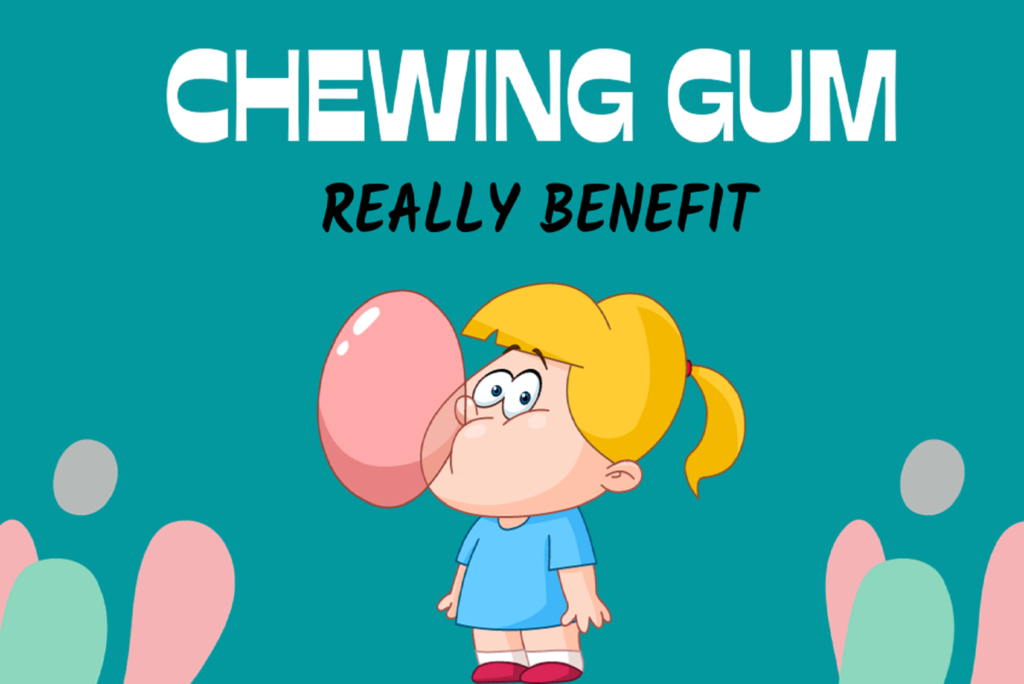Let us know from our dentist in Bilaspur whether chewing gum really benefits our teeth and gums.
Karmanya DewanganNovember 8, 2023
We’ve all heard the age-old adage: “An apple a day keeps the doctor away.” But what about chewing gum? Can a stick of gum a day keep the dentist at bay?
Many of us have grown up with the notion that chewing gum is bad for our teeth, but is this always the case?
Let’s delve into the intriguing topic of whether chewing gum benefits our teeth and gums.
To shed light on this matter, we’ll consult with a trusted dentist in Bilaspur and explore the science behind this common habit.
The Benefits of Chewing Gum
Chewing gum, when sugar-free and enjoyed in moderation, can indeed offer some advantages for oral health.

Here are a few ways in which it can be beneficial:
1. Increased Saliva Production:
Chewing gum stimulates the salivary glands, leading to increased saliva production. Saliva plays a vital role in maintaining oral health by helping to neutralize acids, wash away food particles, and enhance the remineralization of tooth enamel.
2. Reduced Dry Mouth:
For individuals who suffer from dry mouth, chewing sugar-free gum can help alleviate this discomfort by promoting saliva flow, which, in turn, aids in the prevention of cavities and bad breath.
3. Improved Freshness:
Chewing gum with natural or artificial flavours can provide a quick and convenient way to freshen your breath when you’re on the go.
4. Plaque Reduction:
Some studies have suggested that sugar-free gum containing xylitol, a natural sweetener, can help reduce plaque and inhibit the growth of harmful bacteria in the mouth.
Consulting a Dentist in Bilaspur
To gain a better understanding of the topic, we turned to Dr. Maya Sharma, a respected dentist in Bilaspur.
Dr. Sharma shared her insights on the matter, emphasizing the importance of making informed choices when it comes to chewing gum.
Dr. Sharma explains that not all chewing gum is created equal. While sugar-free gum can be beneficial for oral health, gum containing sugar should be avoided, as it can contribute to tooth decay.
She adds, “I often advise my patients to choose sugar-free gum, preferably with xylitol, as it can provide some advantages in terms of oral health.”
Furthermore, Dr. Sharma highlights the significance of moderation. “Chewing gum should not be used as a substitute for good oral hygiene practices, such as regular brushing and flossing,” she emphasizes. “It should be seen as a supplementary aid in maintaining oral health.”
The Science Behind Chewing Gum
The science behind the benefits of chewing gum lies in the stimulation of saliva production. Saliva contains essential minerals like calcium and phosphate, which help to remineralize tooth enamel and repair minor damage caused by acids.
By increasing saliva flow, chewing gum can help counteract the harmful effects of acidic foods and beverages and maintain a healthier oral environment.
Chewing gum can also be a helpful tool in managing dry mouth, a condition that can lead to discomfort and an increased risk of oral health issues.
By promoting saliva production, gum can offer relief to those suffering from this condition.
Xylitol, a sugar substitute found in some sugar-free gum, has been the subject of scientific research.
Studies have suggested that xylitol can disrupt the growth of harmful bacteria in the mouth and reduce plaque formation. This can contribute to better oral health and a lower risk of cavities.
Chewing Gum as a Preventive Measure
While chewing gum can offer several benefits for oral health, it is essential to remember that it should not replace regular dental care practices.
Instead, it can serve as a complementary tool in maintaining a healthy mouth.
Dentists often recommend the following guidelines for using gum effectively:
- Choose sugar-free gum with xylitol or other natural sweeteners to reduce the risk of cavities.
- Chew gum for about 20 minutes after meals or snacks to stimulate saliva production and aid in the removal of food particles.
- Avoid gum with added sugars, as sugar can contribute to tooth decay.
- Don’t rely solely on chewing gum for oral hygiene; continue to brush your teeth at least twice a day, floss daily, and schedule regular dental check-ups.
benefits our teeth and gums : Conclusion
So, does chewing gum benefit our teeth and gums?
The answer is a qualified yes. Chewing sugar-free gum, especially varieties containing xylitol, can be a helpful tool in promoting oral health by increasing saliva production, reducing dry mouth, and potentially inhibiting harmful bacteria.
However, it’s crucial to make the right choices when it comes to gum selection and use it as a supplement to proper oral hygiene practices.
In the words of our trusted dentist in Bilaspur, Dr. Maya Sharma, “Chewing gum can be part of a well-rounded approach to oral health, but it should never replace essential dental care habits.
” So, if you’re considering incorporating gum into your routine, remember to consult with your dentist and choose wisely to enjoy the potential benefits while minimizing any drawbacks.
Categories: blog_post